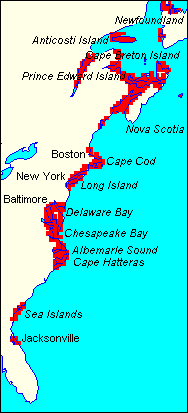
United States of America

|
|
 |
"I burned their cities with fire, destroyed, and devastated. Like a Thunderer I crushed the corpses of their warriors in battle. I made their blood to flow over all the ravines and high places of mountains. I cut off their heads and piled them up at the walls of their cities like heaps of grain. I carried off their booty, their goods, and their property beyond reckoning. The Lord God who has enlarged my Commonwealth, who has given me strength and power as my portion, commanded me to extend the territory of His dominion, putting into my hand their powerful weapons, the cyclone of battle. I subjugated lands and mountains, cities and their rulers, enemies of God, and conquered their territories." |  |
| -- Monumental inscription dated to the reign of President George Bush VII |
As industrial civilization shrivelled and died, it became more and more difficult for Washington to control all 50 states from sea to shining sea. After a few generations of nominal subservience, the most distant states began to break off and explore their own destinies. After a few more generations, even the nearer states were acting more like independent nations rather than subservient subunits. After about a century, federal power had shrunk to a point where it controlled little more than the Potomac Basin and the Chesapeake Bay, and not always all of that.
The Chesapeake, however, proved to be the focus for the next phase of the history of the USA. Along the shores of the Bay, where goods are moved more easily by boat than by wagon, an experienced community of mariners had developed, and they fanned out over the oceans in search of plunder (where possible) and trade (if the natives put up too much of a fight). The US Navy easily established bases along other convoluted coastlines of the Atlantic such as on Long Island Sound, Narragansett Bay, Albemarle Sound and the Gulf of St. Lawrence. They prospered by carrying tropical goods to the North and polar goods to the South, and the United States of America survived to be a major player in eastern politics.
Like most mercantile states, the USA is a republic ruled by a Senate of wealthy families, although its center has shifted from Washington (which is recognized as an autonomous district under the control of the Non-Denominational Church) to Baltimore instead.
- System of Government: Republic
- Legal classification: Commonwealth
- Head of State: President
- Population : 1 million
- Religion: Non-Denominational
- Church Supervisors appointed by the President: Delaware, Maryland, Massachussetts, Rhode Island
- Totemic Symbol: Bald Eagle
- Map
| Source |
|---|
| Littoral Regions |
Last Updated March 2003
Copyright © 1999-2003 Matthew White
